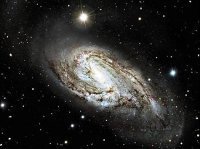Our Universe rotates around its 'axis of evil'
 A team of scientists from the University of Michigan led by Michael Longo, while exploring the direction of rotation of 15 872 spiral galaxies, came to the conclusion that our universe may have been rotating around its axis as whirligig from its birth. In addition, the studies of the Americans actually disprove the hypothesis that the universe is isotropic and symmetric.
A team of scientists from the University of Michigan led by Michael Longo, while exploring the direction of rotation of 15 872 spiral galaxies, came to the conclusion that our universe may have been rotating around its axis as whirligig from its birth. In addition, the studies of the Americans actually disprove the hypothesis that the universe is isotropic and symmetric.
The research was conducted as a part of Sloan Digital Sky Survey (SDSS). At first, scientists tried to find evidence that the universe has the properties of mirror symmetry. In this case, they reasoned, the number of galaxies that rotate clockwise and those that are "twisted" in the opposite direction, would be the same.
However, it turned out that towards the north pole of the Milky Way counterclockwise rotation among spiral galaxies is dominant, that is, they are oriented in the right direction. This trend is visible even at a distance of more than 600 million light years.
Of course, it all seems quite arbitrary, because if the observer is positioned at the other side, it would seem that the galaxy is moving in the opposite direction. Nevertheless, the notion of the direction of rotation is fully applicable to the visible galaxies projected onto the celestial sphere.
The head of the research team Michael Longo said that the symmetry distortion is small, approximately seven percent, but the likelihood that this is a cosmic accident is somewhere around one millionth. He commented that the results of the research are important because they seem to contradict the nearly universal notion that at a sufficiently large scale, the universe is isotropic, i.e., does not have a pronounced direction.
Also read: Grigori Perelman claims he can control Universe
The researchers say that the symmetric and isotropic universe should have formed from a spherically symmetric explosion. Such an explosion should have resembled a basketball in shape. However, if at birth the universe revolved around its axis in one direction, then the galaxies would have retained the rotation. Since they rotate in different directions, the Big Bang had a diverse focus. However, most likely, the universe is still spinning, as suggested by Longo's research.
Incidentally, a few years ago, an American space probe engaged in measuring the temperature of radiation in different parts of the galaxies in space discovered a mysterious linear region that permeates the universe. It turned out that this line was the "backbone" around which the three-dimensional model of the universe is formed. This discovery has made significant adjustments to the ideas about the evolution of the universe that existed until recently.
For example, according to the theory of relativity, after the Big Bang the universe evolved randomly. However, measurements of the cosmic microwave background radiation temperature suggest that its structure may have some systematic order. The entire structure of the universe is formed around the field line radiation, the so-called "axis of evil" as the researchers dubbed it.
Also read: The Devolving Universe
Previously, Michael Longo already assumed the "right" orientation of the universe. But then his calculations were subject to intense criticism from his colleagues. In particular, many have pointed out that people, analyzing any image unconsciously, give priority to the right side, as most of us are right-handed.
However, using special probabilistic methods, Longo managed to fix the error and obtain the results similar to the previous ones. Yet, a plausible answer to the question of why the "right" galaxies are predominant is yet to be found.
However, the principle of asymmetry is typical for most objects in the universe. Even the human body is not symmetrical, and there are always more or less noticeable differences between the right and left sides, not to mention the location of the internal organs with the heart on the left, liver on the right, and so on. We can assume that the same principle is observed in other areas of the universe.
To date, Longo's group studied only the galaxies located in the northern hemisphere of the sky as the telescope project SDSS is located in New Mexico. In their continued work scientists will study the southern hemisphere - in theory, there galaxies rotating clockwise should be dominating.
Irina Shlionskaya
Pravda.Ru
Subscribe to Pravda.Ru Telegram channel, Facebook, RSS!




